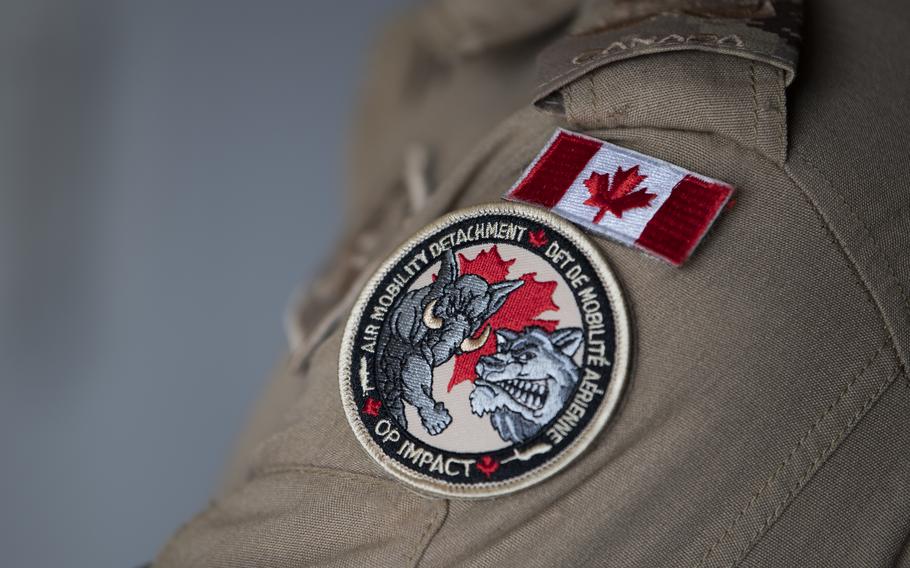
Royal Canadian Air Force OP IMPACT patch is shown in this undated photo. Sexual misconduct allegations in the Canadian military should be exclusively investigated and prosecuted by civilian authorities, a blistering report from a former Supreme Court justice concluded Monday. (Robert Cloys/U.S. Air Force )
TORONTO — Sexual misconduct allegations in the Canadian military should be exclusively investigated and prosecuted by civilian authorities, a blistering report from a former Supreme Court justice concluded Monday.
The government-commissioned report from Louise Arbour, who also served as the U.N. high commissioner for human rights, came during a wave of sexual misconduct allegations against top military leaders that have rocked the armed forces and eroded public trust.
"The exposure of sexual misconduct in the [Canadian Armed Forces] has shed light on a deeply deficient culture fostered by a rigid and outdated structure that did little to modernize it," Arbour wrote in the report.
A danger of the military's operating model, she wrote, is a "high likelihood that some of its members are more at risk of harm, on a day-to-day basis, from their comrades than from the enemy." She said the crisis "has caused as much damage as defeat in combat would have to demoralize the troops and shock Canadians."
Among the report's 48 recommendations were calls for sexual harassment complaints to be turned over to the Canadian Human Rights Commission and for officials to explore whether there should be an alternative to military colleges, which Arbour wrote "appear as institutions from a different era."
Anita Anand, Canada's defense minister, said she agreed with all of the "thoughtful" recommendations and would take immediate steps to implement 17 of them, including the appointment of an external monitor who would oversee the process.
"I recognize that some may express skepticism about our ability to achieve and our commitment to pursue reform," she said. "Let me clearly state my belief that this is the moment to create change and we expect the Canadian Armed Forces and the department of national defense to establish meaningful reforms."
Anand said the government would study the remaining recommendations, including, pivotally, whether to give civilian authorities exclusive jurisdiction over sexual misconduct offenses. She said that they involve "further analysis, planning and consultation" and that she would inform Parliament by the end of the year which ones won't be implemented.
The problem of sexual misconduct in the military is not new — or new to Canadians. But a spate of high-profile cases in the past year have focused attention on the issue once again.
Gen. Jonathan Vance, who retired as chief of the defense staff last year, pleaded guilty in March to obstruction of justice. He was accused of having contacted Maj. Kellie Brennan multiple times by phone to push her to make false statements to military police about a relationship they had while she was his subordinate.
An agreed statement of facts submitted to the court said Vance had conversations with Brennan "about a collaborative and mutually beneficial response to publicity concerning their clandestine, intimate relationship" and "promoted a false narrative," pushing her to deny that they had sex while he was chief of the defense staff.
It also said that they have a child together.
Vance's successor, Adm. Art McDonald, temporarily stepped aside as chief of the defense staff - the equivalent of the U.S. chairman of the Joint Chiefs of Staff — last year after the military opened an investigation into sexual misconduct allegations. It did not charge him. McDonald said he intends to retire, according to Global News.
Among the other leaders who have faced sexual misconduct allegations in the last year are the military's head of human resources and the soldier who was tapped with overseeing the logistics of Canada's coronavirus vaccine rollout. Both have denied wrongdoing. Several officials have been placed on leave or pushed into retirement.
In 2015, former Supreme Court justice Marie Deschamps found an "underlying sexualized culture" in the military and a perception in the lower ranks "that those in the chain of command either condone inappropriate sexual conduct, or are willing to turn a blind eye."
In 2019, the federal government set aside more than $700 million for victims of sexual misconduct and gender discrimination in the Canadian Armed Forces and the defense department.
But significant changes have not materialized, and many of the same problems persist.
The armed forces have resisted outside calls for change, Arbour wrote, "choosing the letter over the spirit, often the appearance of implementation over its substance, thereby entrenching their ways of operating."
Arbour noted in the report that some recommendations have already met opposition.
Last year, Anand temporarily accepted a recommendation made in Arbour's interim report that all sexual assaults and other criminal offenses of a sexual nature alleged to have been perpetrated by a member of the armed forces be referred to civilian authorities.
In the report released Monday, Arbour wrote that she was led to believe in conversations with police and prosecution officials that "taking over this relatively small number of cases would not be a problem," but in the months that followed, there was resistance and some police forces refused to accept files involving members of the military.
"The number of cases, spread across the country, with slightly higher volume around CAF bases and wings, and virtually none elsewhere, hardly justifies this refusal to enforce the law," Arbour wrote.
The best way forward, she added, "is to provide for the exclusive jurisdiction of civilian courts in all matters of sexual misconduct falling under the Criminal Code."
Arbour pointed to two impediments to progress: the assumption that the crisis is "only attributable to a culture of misogyny" and that change will come over time with "more enlightened attitudes," and a belief within the Canadian Armed Forces that it can fix the system alone.
"I just hope that these recommendations don't end up a little box on their chart of the many that are still being studied," Arbour told reporters in Ottawa.